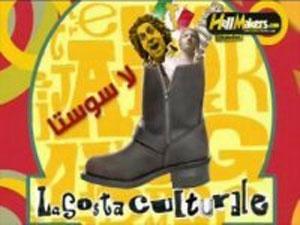Egypt’s Ali G.
A new Egyptian TV show features a fake Italian talk show host who interviews unsuspecting Egyptian officials. He asks them sexually suggestive questions, which is taboo in Egypt. But the flamboyant host of “La Sosta Culturale’”steers well clear of political satire. Along the way, he’s earning a reputation as “the Egyptian Ali G.”
Julia Simon, correspondent for PRI’s “The World,” sat down to watch the show with a friend in Cairo. The following is her report.
Kareem Nasser and I are at sitting in an apartment in downtown Cairo, watching scenes from an Egyptian television show that debuted this past August. It’s called “La Sosta Culturale” and it isn’t your typical Egyptian interview show.
This may be relatively tame for an American audience, but for Egyptians, this kind of sexual talk isn’t something you hear on TV every day and it comes from the show’s host.
“He’s called Martello Rufiano. Martello actually is a hammer, Rufiano is a pimp in Italian. But nobody knows about this, huh?” says Akram al-Sharkawy, talking about his character, Martello Rufiano, the flamboyant Italian host of “La Sosta Culturale.”
Rufiano’s a little like Sasha Baron-Cohen’s alter ego, Ali G. Most of his guests don’t know he is playing a fictional character. Al-Sharkawy says that playing an Italian makes it easier for him to ask his guests the provocative and sexually charged questions that are normally so taboo in Egyptian society.
But while al-Sharkawy jokes about sex, he steers clear of politics. He shelved an episode that featured an interview with Talaat Sadat, the nephew of the former Egyptian president. Al-Sharkawy says that Sadat’s harsh attacks on Egypt’s current president, Hosni Mubarak, were too negative for air.
When it comes to attacking the Egyptian government on TV, the repercussions aren’t a joke. Another comedy, the “Hokuma Show,” or “the government show,” was also supposed to debut in August. That show poked fun at high government officials, including the prime minister, but before it could premiere, the Egyptian Ministry of Information pulled the plug. In Egypt, the political elite are largely untouchable.
Sociologist Said Sadek calls it the deification of leaders, turning them into gods like the ancient Egyptian pharaohs. “So if you have a comedy show that attacks this aura of glory and immunity around the leader, it is immediately a call for action by the censorship.”
Egyptians love comedy, and Abeer Solimon believes that comedy has an important role to play in Egypt’s social and political evolution. She’s program director for the Arabic Network for Human Rights Information.
“For sure, comedy is one of the biggest channels to talk to the normal Egyptian human in the street because you can write articles, issue books, and release whatever you want but not everybody reads. But everybody watches TV and comedy is finally the easiest way to peoples’ hearts.”
For comedians like al-Sharkawy, such political humor will have to stay in the green room. But others hope that someday these jokes will reach the Egyptian airwaves and help promote the kind of political change only dreamed of in their punch lines.
PRI’s “The World” is a one-hour, weekday radio news magazine offering a mix of news, features, interviews, and music from around the globe. “The World” is a co-production of the BBC World Service, PRI and WGBH Boston.
Every day, reporters and producers at The World are hard at work bringing you human-centered news from across the globe. But we can’t do it without you. We need your support to ensure we can continue this work for another year.
Make a gift today, and you’ll help us unlock a matching gift of $67,000!
